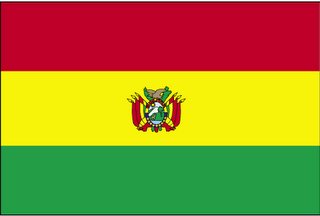"an issue ....specific to climate change"
UNITED NATIONS, September 22 – During a press conference at United Nations Headquarters this morning, Bolivian President Evo Morales Ayma Of Bolivia declared that “capitalist lifestyles” were at the root of climate change problems, as he discussed key proposals to protect the environment and bring to justice those who contributed to pollution.
Evo Morales, says his country will push for the founding of an international "green" tribunal to punish nations, corporations and multinational companies that harm the environment.
Evo Morales, says his country will push for the founding of an international "green" tribunal to punish nations, corporations and multinational companies that harm the environment.
.
"A climate change tribunal for the administration of justice must be created in order to discipline those who fail to recognize the error of their ways. This is why Copenhagen will be very interesting in terms of discussing such issues. This is an issue that is specific to climate change."
.
Morales' proposal is one of hundreds of contentious ideas still outstanding in the run-up to the December international climate change conference to be held in Copenhagen
In addition the global push to address man made changes to the weather-- Chinese President Hu Jintao and his Morales pledged on Monday to further develop the friendly cooperative relations between the two countries.
During his meeting with Morales, Hu said that thanks to the joint efforts of both sides, both countries have pushed forward bilateral relations in recent years, and cooperation in such fields as economy and trade, culture, education, science and technology and sports has produced fruitful results.
China attaches great importance to developing its friendly cooperative relations with Bolivia, and is ready to work with the Bolivian side to further develop relations between the two countries, he said.
The Chinese president put forth a four-point proposal on the further development of China-Bolivia relations.
In addition the global push to address man made changes to the weather-- Chinese President Hu Jintao and his Morales pledged on Monday to further develop the friendly cooperative relations between the two countries.
During his meeting with Morales, Hu said that thanks to the joint efforts of both sides, both countries have pushed forward bilateral relations in recent years, and cooperation in such fields as economy and trade, culture, education, science and technology and sports has produced fruitful results.
China attaches great importance to developing its friendly cooperative relations with Bolivia, and is ready to work with the Bolivian side to further develop relations between the two countries, he said.
The Chinese president put forth a four-point proposal on the further development of China-Bolivia relations.
Labels: Evo Morales United Nations Pacha Mama climate change Hu Jintao China




